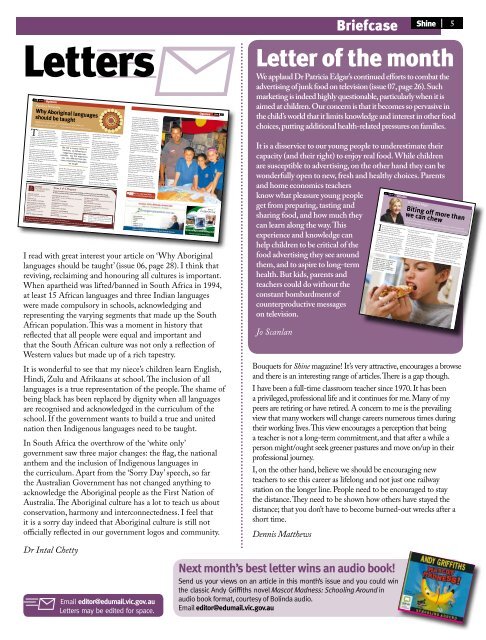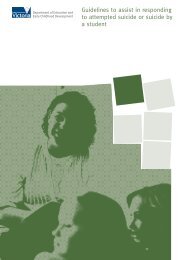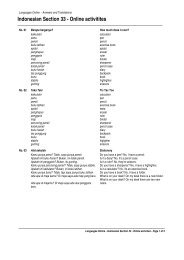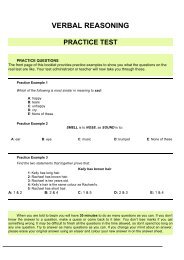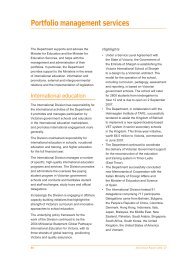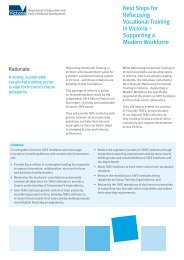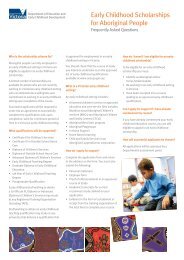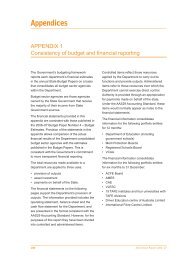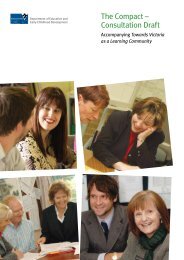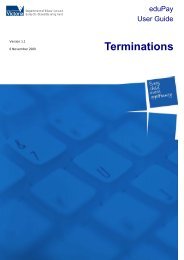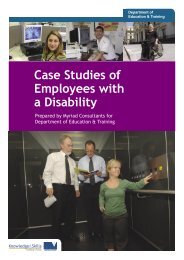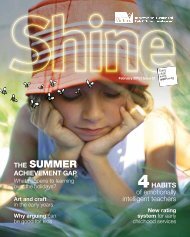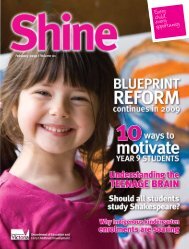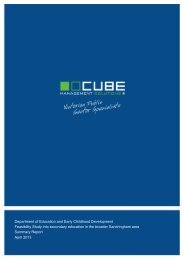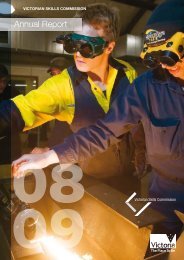Shine Magazine, Issue 9, October 2009 - Department of Education ...
Shine Magazine, Issue 9, October 2009 - Department of Education ...
Shine Magazine, Issue 9, October 2009 - Department of Education ...
You also want an ePaper? Increase the reach of your titles
YUMPU automatically turns print PDFs into web optimized ePapers that Google loves.
Letters<br />
T<br />
28 Apr Jul 09 Opinion<br />
Pandora Petrovska<br />
Why Aboriginal languages<br />
should be taught<br />
“Before we started I had absolutely no idea that our<br />
language even existed.” – VCE Indigenous Reclamation Language Student<br />
here is something pr<strong>of</strong>oundly<br />
sad about a young person being<br />
oblivious to their own history.<br />
Knowledge about oneself and one’s<br />
heritage is fundamental to our sense <strong>of</strong> self, and<br />
understanding <strong>of</strong> the world. Language is an<br />
enduring marker <strong>of</strong> identity and culture, and this<br />
story shows how individuals strive to overcome<br />
the deep wounding <strong>of</strong> past policy affecting self, to<br />
this day.<br />
It was the summer <strong>of</strong> 2005 when I first met<br />
Wotjobaluk woman Jennifer Beer from the<br />
Wimmera, as she stood in the doorway <strong>of</strong> my<br />
<strong>of</strong>fice. It was hot and she had trave led from<br />
Horsham to Melbourne to meet with somebody<br />
who could help her realise her dream: the teaching<br />
<strong>of</strong> her language, Wergaia.<br />
Jennifer Beer is one <strong>of</strong> those remarkable characters<br />
you are truly fortunate to meet in a lifetime; a<br />
person whose vision inspires many to do things<br />
they never imagined were possible, like asking for<br />
the basic rights we take for granted. For Jennifer,<br />
this meant teaching a Victorian Aboriginal<br />
language that is no longer spoken as a primary<br />
means <strong>of</strong> communication.<br />
It is a well-known fac that after the establishment<br />
FRIDAY 31 JULY<br />
Phonics and Spe ling in the Early<br />
Years<br />
David Hornsby<br />
PREP TO YEAR 2 TEACHERS<br />
WEDNESDAY 12 AUGUST<br />
Three Dimensions in a Day – Part 2:<br />
Measurement, Chance & Dat and<br />
Working Mathematically<br />
Rob Vingerhoets<br />
(can be a tended as a stand-alone<br />
seminar)<br />
PREP TO YEAR 6 TEACHERS<br />
<strong>of</strong> government and church missions, where<br />
Aboriginal people were forbidden to speak their<br />
language, or practise their culture, the transmission<br />
<strong>of</strong> Victorian Aborigina languages ceased. This,<br />
and the threat <strong>of</strong> having their children removed,<br />
was an effective mechanism to achieve a situation<br />
where these languages simply faded.<br />
Jennifer Beer had come to the right place: the<br />
Victorian School <strong>of</strong> Languages, a specialist<br />
government language school teaching 45<br />
languages in over 40 schools in Melbourne and<br />
country Victoria, as we l as a distance education<br />
section teaching nine languages to a l school<br />
sectors. With broad VCE provision, many<br />
thousands <strong>of</strong> students around the state, and<br />
Term 3 & 4 Program<br />
THURSDAY 20 AUGUST<br />
Project-Based Learning in the Middle Years <strong>of</strong> Schooling<br />
Darryn Kruse<br />
YEARS 3 TO 9 TEACHERS<br />
THURSDAY 27 AUGUST<br />
Comprehension and Strategies for Fiction<br />
Deb Sukarna<br />
YEARS 3 TO 9 TEACHERS<br />
TUESDAY 1 SEPTEMBER<br />
Assessment for Learning in the Inquiring Classroom<br />
Kath Murdoch<br />
PREP TO YEAR 6 TEACHERS<br />
We had a country centre at<br />
Horsham, so delivering an<br />
Indigenous language was<br />
possible. But this experience<br />
was very different from the<br />
many established languages<br />
we taught.<br />
I read with great interest your article on ‘Why Aboriginal<br />
languages should be taught’ (issue 06, page 28). I think that<br />
reviving, reclaiming and honouring all cultures is important.<br />
When apartheid was lifted/banned in South Africa in 1994,<br />
at least 15 African languages and three Indian languages<br />
were made compulsory in schools, acknowledging and<br />
representing the varying segments that made up the South<br />
African population. This was a moment in history that<br />
reflected that all people were equal and important and<br />
that the South African culture was not only a reflection <strong>of</strong><br />
Western values but made up <strong>of</strong> a rich tapestry.<br />
It is wonderful to see that my niece’s children learn English,<br />
Hindi, Zulu and Afrikaans at school. The inclusion <strong>of</strong> all<br />
languages is a true representation <strong>of</strong> the people. The shame <strong>of</strong><br />
being black has been replaced by dignity when all languages<br />
are recognised and acknowledged in the curriculum <strong>of</strong> the<br />
school. If the government wants to build a true and united<br />
nation then Indigenous languages need to be taught.<br />
In South Africa the overthrow <strong>of</strong> the ‘white only’<br />
government saw three major changes: the flag, the national<br />
anthem and the inclusion <strong>of</strong> Indigenous languages in<br />
the curriculum. Apart from the ‘Sorry Day’ speech, so far<br />
the Australian Government has not changed anything to<br />
acknowledge the Aboriginal people as the First Nation <strong>of</strong><br />
Australia. The Aboriginal culture has a lot to teach us about<br />
conservation, harmony and interconnectedness. I feel that<br />
it is a sorry day indeed that Aboriginal culture is still not<br />
<strong>of</strong>ficially reflected in our government logos and community.<br />
Dr Intal Chetty<br />
recent delivery <strong>of</strong> Yorta Yorta in partnership with<br />
Northland Secondary Co lege, we were we l<br />
placed to assist.<br />
We had a country centre at Horsham, so<br />
delivering an Indigenous language was possible.<br />
Bu this experience was very different from the<br />
many established languages we taught. There were<br />
no dictionaries or grammar books. Even when<br />
we undertake the teaching <strong>of</strong> refugee languages,<br />
like Dinka and Somali, materials have <strong>of</strong>ten been<br />
developed internationa ly, and may be adapted<br />
for the Australian classroom. This required a<br />
partnerships and co laboration with many to<br />
become a reality.<br />
Permission to undertake the reclamation and<br />
revival <strong>of</strong> Wergaia was given by the community<br />
in the Wimmera, and after consultation with the<br />
Local Aboriginal <strong>Education</strong> Consultative Group<br />
(LAECG) and the Land Council, the community<br />
received funding from the Victorian Aboriginal<br />
Corporation for Languages (VACL) to develop<br />
a Wergaia word list. Monash University linguist,<br />
Dr Julie Reid, developed the Wergaia Community<br />
Grammar and Dictionary in 2007.<br />
For the firs time, Wergaia was taught at VCE<br />
level to students in Horsham and Ba larat using<br />
Ivanhoe Grammar School is committed to building academic pr<strong>of</strong>essional knowledge through<br />
the delivery <strong>of</strong> high quality seminars and workshops presented by internal and external speakers.<br />
FRIDAY 9 OCTOBER<br />
Ensuring an Effective and Strong Final Term in Maths<br />
Rob Vingerhoets<br />
PREP TO YEAR 6 TEACHERS<br />
THURSDAY 15 OCTOBER<br />
Mathematics – Teaching and Learning the Four<br />
Operations in Number<br />
Michael Ymer<br />
PREP TO YEAR 6 TEACHERS<br />
Fo registration forms and enquiries, please contact Paula Welham on:<br />
Telephone: 9490 1877 • Mobile: 0488 110 000 • Email: mail@ivanhoepl.com • Book online: www.ivanhoepl.com<br />
Where: Darebin Arts & Entertainment Centre<br />
(Cnr Be l Street & St Georges Road, Preston)<br />
Time: 9:30am – 3:30pm (Registration from 9:00am)<br />
Cost: $185 (inc. GST). Cost includes morning tea,<br />
lunch& hand-outs<br />
our video conferencing facility in Thornbury.<br />
Linguist Dr Julie Reid conducted weekly twohour<br />
classes, and regular one-day workshops<br />
in Ba larat in accordance with the VCE Study<br />
Design for Indigenous Languages <strong>of</strong> Victoria:<br />
Revival and Reclamation, which was specifically<br />
designed to teach the fundamentals <strong>of</strong> language<br />
reclamation.<br />
The starting point for the linguist, and the class,<br />
was the sketch grammar written by Hercus<br />
(1986) based on 1960s audio recordings <strong>of</strong><br />
individuals speaking Wergaia. Unbeknowns to<br />
her, these audio recordings had captured the voice<br />
<strong>of</strong> one <strong>of</strong> Jennifer’s own relatives. “I remember<br />
growing up hearing Uncle Walter and others<br />
speak language as a sma l child, but I did not<br />
know he had been recorded,” she told me. “When<br />
I heard his voice on the tapes, I had a deep sense<br />
<strong>of</strong> pride.”<br />
Seeing these VCE Indigenous Language<br />
Reclamation students successfu ly complete their<br />
studies and receive validation from Minister<br />
for <strong>Education</strong> Bronwyn Pike, at our VCE Top<br />
Scorers Function was bri liant. The joy for me<br />
wi l be seeing what they do with this knowledge<br />
in the future and the language classes they wi l<br />
teach. On reflection, as I write this, I understand<br />
why I came to spend so many years with this<br />
language school.<br />
Pandora Petrovska is assistant principal <strong>of</strong> the<br />
Victorian School <strong>of</strong> Languages (VSL). She leads<br />
curriculum and training for over 700 language<br />
teachers employed by the VSL statewide and has<br />
been instrumental in the implementation <strong>of</strong> VELS<br />
electronic reporting and many other projects at the<br />
VSL, which are shared across a l government schools.<br />
Tell us what you think.<br />
Email editor@edumail.vic.gov.au<br />
Email editor@edumail.vic.gov. au<br />
Letters may be edited for space.<br />
Opinion<br />
<strong>Shine</strong> 29<br />
Briefcase<br />
<strong>Shine</strong> 5<br />
Letter <strong>of</strong> the month<br />
We applaud Dr Patricia Edgar’s continued efforts to combat the<br />
advertising <strong>of</strong> junk food on television (issue 07, page 26). Such<br />
marketing is indeed highly questionable, particularly when it is<br />
aimed at children. Our concern is that it becomes so pervasive in<br />
the child’s world that it limits knowledge and interest in other food<br />
choices, putting additional health-related pressures on families.<br />
It is a disservice to our young people to underestimate their<br />
capacity (and their right) to enjoy real food. While children<br />
are susceptible to advertising, on the other hand they can be<br />
wonderfully open to new, fresh and healthy choices. Parents<br />
and home economics teachers<br />
know what pleasure young people<br />
get from preparing, tasting and<br />
sharing food, and how much they<br />
can learn along the way. This<br />
experience and knowledge can<br />
help children to be critical <strong>of</strong> the<br />
food advertising they see around<br />
them, and to aspire to long-term<br />
health. But kids, parents and<br />
teachers could do without the<br />
constant bombardment <strong>of</strong><br />
counterproductive messages<br />
on television.<br />
Jo Scanlan<br />
Bouquets for <strong>Shine</strong> magazine! It’s very attractive, encourages a browse<br />
and there is an interesting range <strong>of</strong> articles. There is a gap though.<br />
I have been a full-time classroom teacher since 1970. It has been<br />
a privileged, pr<strong>of</strong>essional life and it continues for me. Many <strong>of</strong> my<br />
peers are retiring or have retired. A concern to me is the prevailing<br />
view that many workers will change careers numerous times during<br />
their working lives. This view encourages a perception that being<br />
a teacher is not a long-term commitment, and that after a while a<br />
person might/ought seek greener pastures and move on/up in their<br />
pr<strong>of</strong>essional journey.<br />
I, on the other hand, believe we should be encouraging new<br />
teachers to see this career as lifelong and not just one railway<br />
station on the longer line. People need to be encouraged to stay<br />
the distance. They need to be shown how others have stayed the<br />
distance; that you don’t have to become burned-out wrecks after a<br />
short time.<br />
Dennis Matthews<br />
Next month’s best letter wins an audio book!<br />
26 Aug Apr 09<br />
Opinion<br />
Send us your views on an article in this month’s issue and you could win<br />
the classic Andy Griffiths novel Mascot Madness: Schooling Around in<br />
audio book format, courtesy <strong>of</strong> Bolinda audio.<br />
Email editor@edumail.vic.gov.au<br />
I<br />
sat on the beach last summer observing<br />
the parade <strong>of</strong> bodies, recalling<br />
photographs taken <strong>of</strong> my children<br />
playing on that same beach one<br />
generation before. The difference was massive.<br />
Australians are now among the fattest people<br />
on the planet. Twenty per cent <strong>of</strong> Australian<br />
children are overweight and 10 per cent are<br />
obese. These young people will battle i lness<br />
for most <strong>of</strong> their lives – type 2 diabetes, bone<br />
disease, respiratory and cardiovascular diseases.<br />
Studies pu the cost <strong>of</strong> obesity in children<br />
and adults in Australia in excess <strong>of</strong> $21<br />
bi lion dollars. Researchers are warning that,<br />
In Sweden, television advertising<br />
to children under 12 has been<br />
banned since 1991. In the UK,<br />
television regulator Ofcom<br />
banned junk food advertising in<br />
and around children’s television<br />
programs in 2007.<br />
Opinion<br />
Dr Patricia Edgar<br />
Biting <strong>of</strong>f more than<br />
we can chew<br />
Children are targeted relentlessly by fast food companies with irresponsible<br />
marketing campaigns. As teachers – your voices should be raised in this debate.<br />
for the firs time in more than a century, life<br />
expectancy may fall.<br />
The psychological impact <strong>of</strong> obesity can<br />
be as damaging as the physical effects with<br />
many children demonstrating increased levels<br />
<strong>of</strong> stress with effects on their behaviour,<br />
concentration, learning ability and mood. I<br />
am sure teachers observe these symptoms in<br />
classrooms across the state.<br />
We are hearing more and more messages about<br />
healthy eating bu they get lost under the<br />
welter <strong>of</strong> products designed to tempt, which<br />
are thrust under our noses. In supermarkets<br />
there are lo lies, chips, chocolates and biscuits<br />
all on shelves at children’s eye level so they can<br />
pester their parents.<br />
It’s not just the amount o food we now eat<br />
but also what is in the food – the saturated<br />
fats and the quantity <strong>of</strong> sugar – that make the<br />
battle to keep weight within normal range<br />
a cha lenge for many people. The way food<br />
and drink is advertised creates confusion<br />
about what are the contents <strong>of</strong> food products<br />
and what represents healthy eating. Labels<br />
trumpet: 20 per cent less fat; 70 per cent less<br />
sugar, but the real meaning is less clear.<br />
Children are targeted relentlessly by<br />
companies and advertisers with irresponsible<br />
marketing<br />
fat, sugar an<br />
promotions<br />
Shrek promo<br />
popcorn, Cok<br />
Without<br />
a very un<br />
Sophistry bedevil<br />
industry’s role in t<br />
industry insists we<br />
media industries in<br />
they only <strong>of</strong>fer ente<br />
calls on parents to b<br />
children: they can tu<br />
refuse to buy, feed th<br />
But business conspire<br />
are way ahead <strong>of</strong> the g<br />
best minds to bear on w<br />
develop the market. The<br />
people genera ly would<br />
<strong>of</strong> french fries or two bu<br />
buy the super size, the va<br />
Super-sizing led to a revo<br />
A serving <strong>of</strong> McDonald’s<br />
ballooned from 200 calorie


